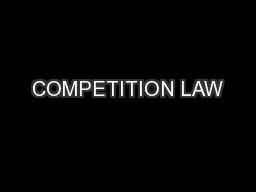PPT-COMPETITION ACT NAME:- MAGRA ASHISH
Author : aaron | Published Date : 2019-02-20
CLASS MCOM SEMII ROLL NO 26 What is competition act It is a situation in a market in which firms or sellers independently strive for the buyers patronage in order
Presentation Embed Code
Download Presentation
Download Presentation The PPT/PDF document "COMPETITION ACT NAME:- MAGRA ASHISH" is the property of its rightful owner. Permission is granted to download and print the materials on this website for personal, non-commercial use only, and to display it on your personal computer provided you do not modify the materials and that you retain all copyright notices contained in the materials. By downloading content from our website, you accept the terms of this agreement.
COMPETITION ACT NAME:- MAGRA ASHISH: Transcript
Download Rules Of Document
"COMPETITION ACT NAME:- MAGRA ASHISH"The content belongs to its owner. You may download and print it for personal use, without modification, and keep all copyright notices. By downloading, you agree to these terms.
Related Documents














